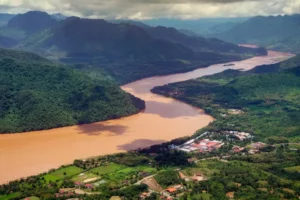The bustling Mekong River, a hive of activity, faces the prospect of transformation due to upcoming developments.
The government, led by Prime Minister Hun Manet, is planning a $1.7 billion China-backed canal.
This canal would create a new trade route from Phnom Penh to the Gulf of Thailand, avoiding Vietnam. It threatens traditional trade paths.
Vietnam, lacking a canal environmental study, has raised alarms.
The project is China’s latest regional infrastructure investment, despite financial concerns and some withdrawn projects.

The canal project indicates Cambodia’s move away from Vietnamese trade control, boosting Beijing’s regional role.
Though Vietnam is a crucial trade ally, the canal may shift regional relations rooted in history and geopolitics.
Planned to stretch over 180 kilometers from the Mekong to Kep province, the canal aims for a 2028 launch.
The ongoing feasibility study by China Road and Bridge Corp. sparks debate over its potential impact and feasibility.
In Kep, the future port site contrasts with its peaceful present. The project aims to cut shipping costs and enhance Cambodia’s market position.
However, sovereignty and environmental concerns persist, despite official claims of minimal harm. Experts warn of possible significant effects on the Mekong Delta.
Vietnam’s worries spotlight the canal’s wider implications for the region’s environment and economic ties.
Despite these, Cambodia’s government intends to proceed, prioritizing national development.
As observers watch, the canal embodies Cambodia’s tricky balancing act among its neighbors.
It seeks economic growth while managing environmental and societal impacts.

